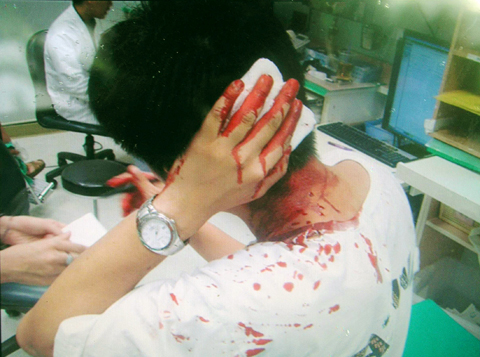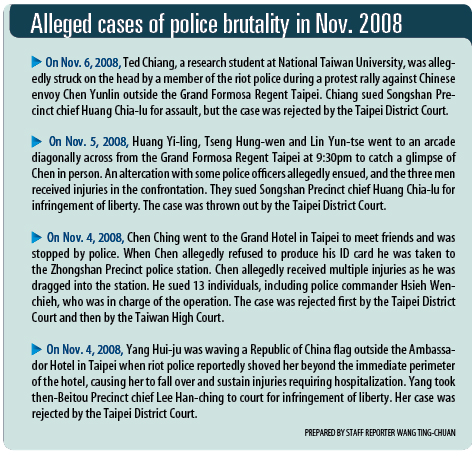The Taipei High Administrative Court has ruled that a protester who was dragged and beaten by unidentified police officers during demonstrations against Chinese envoy Chen Yunlin (陳雲林) in Taipei in 2008 was eligible to receive national compensation after video evidence revealed that he was unarmed and was facing away from police.
In the first compensation decision over the police response to the protests in November 2008, the court said on Wednesday that the Taipei City Government would have to pay Ted Chiang (江一德), a graduate student at National Taiwan University at the time, NT$300,000 in damages and NT$1,680 in medical costs.
The identity of the officers involved in the act was not revealed in the ruling and the officers have yet to be disciplined amid claims of a cover-up after the incident.

PHOTO: YANG KUO-WEN, TAIPEI TIMES
In its verdict on the precedent-setting case, the court said police officers failed to intervene after the clubbing, even as Chiang lay on the ground bleeding. The ruling added that the Taipei City Government failed to account for public safety and that there was a lack of police discipline.
Chiang told the Taipei Times yesterday he was satisfied with the ruling, adding that “it was never about the money — it was about principle and concern over the conduct of police.”
Chiang, who now works as a marketing manager, said he joined the demonstration after seeing footage on TV of police confiscating the national flag as part of the crackdown on the protests.

Soon after the attack, Chiang filed a lawsuit against the commanding officer at the scene. After he lost the lawsuit, he applied for national compensation from the Taipei City Government.
While Taipei Mayor Hau Lung-bin (郝龍斌) yesterday said the city government would not appeal, opposition lawmakers said they hoped the case would reinvigorate other cases of alleged police brutality currently in court.
“In the past, the court always sided against the public on these issues,” Democratic Progressive Party Legislator Wong Chin-chu (翁金珠) said. “This time, however, the judge stood up for the public interest and protected our constitutionally protected freedom of expression.”
Chiang’s lawyer, Wong Kuo-yan (翁國彥), said he respected the Taipei City Government’s decision not to appeal, but said city authorities would have to “determine clearly which [police officers] were involved in the incident.”
The scuffle took place late on the night of Nov. 6, 2008, after about 2,000 students and activists surrounded and blockaded the Grand Formosa Regent hotel, where Chen was attending a dinner hosted by then-Chinese Nationalist Party (KMT) chairman Wu Poh-hsiung (吳伯雄).
Hundreds of police in full riot gear later descended on the protesters and escorted the Chinese envoy out of the hotel at about 2am, resulting in clashes with the mostly unarmed crowd. The rally was dispersed shortly thereafter, but not before allegations of police brutality surfaced.
“We were shocked at what took place that night,” Chiang said.
Video footage showed that along with several other white-shirted protesters, Chiang was looking away from the police line before he was dragged underneath riot shields and beaten with a club.
“Just as I was getting up again, a blow smashed into the back of my head. My whole body went limp and it felt like I was getting shocked by a taser,” he said.
“I had a serious concussion and for a month every time I closed my eyes, it felt like I was on a rollercoaster ride — everything would spin round and round,” he said, adding that his wound required seven stitches.
The cases of police brutality that surfaced following the sporadic protests held throughout that week prompted 25 civic groups and 218 academics to file a petition with the Control Yuan calling for an investigation into the entire National Police Agency-led crackdown.
Hundreds of university students also took part in sit-ins in front of the Executive Yuan and at Liberty Square days later in protest over the police’s actions.
According to the agency, 27 officers of the about 3,000 deployed were injured during the week of protests.
The government maintains that police action taken during “Operation Concord,” as the crackdown was known, was justified.
Taipei City Police Department Spokesman Chou Shou-sung (周壽松) declined to say whether the force would take action against the officers who injured Chiang.
ADDITIONAL REPORTING BY KO SHU-LING

SECURITY: As China is ‘reshaping’ Hong Kong’s population, Taiwan must raise the eligibility threshold for applications from Hong Kongers, Chiu Chui-cheng said When Hong Kong and Macau citizens apply for residency in Taiwan, it would be under a new category that includes a “national security observation period,” Mainland Affairs Council (MAC) Minister Chiu Chui-cheng (邱垂正) said yesterday. President William Lai (賴清德) on March 13 announced 17 strategies to counter China’s aggression toward Taiwan, including incorporating national security considerations into the review process for residency applications from Hong Kong and Macau citizens. The situation in Hong Kong is constantly changing, Chiu said to media yesterday on the sidelines of the Taipei Technology Run hosted by the Taipei Neihu Technology Park Development Association. With

CARROT AND STICK: While unrelenting in its military threats, China attracted nearly 40,000 Taiwanese to over 400 business events last year Nearly 40,000 Taiwanese last year joined industry events in China, such as conferences and trade fairs, supported by the Chinese government, a study showed yesterday, as Beijing ramps up a charm offensive toward Taipei alongside military pressure. China has long taken a carrot-and-stick approach to Taiwan, threatening it with the prospect of military action while reaching out to those it believes are amenable to Beijing’s point of view. Taiwanese security officials are wary of what they see as Beijing’s influence campaigns to sway public opinion after Taipei and Beijing gradually resumed travel links halted by the COVID-19 pandemic, but the scale of

A US Marine Corps regiment equipped with Naval Strike Missiles (NSM) is set to participate in the upcoming Balikatan 25 exercise in the Luzon Strait, marking the system’s first-ever deployment in the Philippines. US and Philippine officials have separately confirmed that the Navy Marine Expeditionary Ship Interdiction System (NMESIS) — the mobile launch platform for the Naval Strike Missile — would take part in the joint exercise. The missiles are being deployed to “a strategic first island chain chokepoint” in the waters between Taiwan proper and the Philippines, US-based Naval News reported. “The Luzon Strait and Bashi Channel represent a critical access

Pope Francis is be laid to rest on Saturday after lying in state for three days in St Peter’s Basilica, where the faithful are expected to flock to pay their respects to history’s first Latin American pontiff. The cardinals met yesterday in the Vatican’s synod hall to chart the next steps before a conclave begins to choose Francis’ successor, as condolences poured in from around the world. According to current norms, the conclave must begin between May 5 and 10. The cardinals set the funeral for Saturday at 10am in St Peter’s Square, to be celebrated by the dean of the College